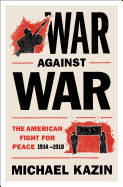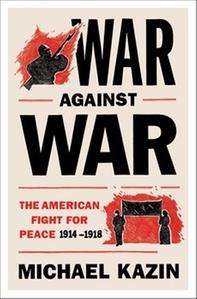
 Michael Kazin is a professor at Georgetown and co-editor of the intellectual leftist magazine Dissent. In his history of the U.S. pacifist movement against involvement in World War I, War Against War, he sympathizes with his subjects. He also expertly conveys the complex and electric prewar political landscape, and the constellation of reasons that many Democrats, Republicans, Socialists, farmers, feminists, left-wing trade unionists, segregationists and liberal immigrants had for banding together in this common cause, and then for breaking apart again.
Michael Kazin is a professor at Georgetown and co-editor of the intellectual leftist magazine Dissent. In his history of the U.S. pacifist movement against involvement in World War I, War Against War, he sympathizes with his subjects. He also expertly conveys the complex and electric prewar political landscape, and the constellation of reasons that many Democrats, Republicans, Socialists, farmers, feminists, left-wing trade unionists, segregationists and liberal immigrants had for banding together in this common cause, and then for breaking apart again.
This was an antiwar movement that Kazin says would not be rivaled until 50 years later, during the Vietnam War. The leaders were not isolationists by any means. Many had close ties to Europe, but they, "like most critics of the war elsewhere in the world, wanted to create a new global order based on cooperative relationships between nation states and their gradual disarmament." And, Kazin says, U.S. involvement may have shortened the war by a year, but it also allowed for the excessively punitive Treaty of Versailles, which in turn "touched off nearly thirty years of genocide, massacres, and armed conflict between and within nations.... The doughboys who helped win the war also made possible a peace of conquerors that stirred resentment on which demagogues and tyrants of all ideological stripes would feed." If we had not entered World War I, he asserts, there would have been no World War II.
The great activist Jane Addams won a Nobel Peace Prize for her consistent opposition to the war. Henry Ford made a "spectacularly ambitious" and naïve attempt to ship pacifists and his wealthy celebrity friends over to negotiate peace in Europe. Woodrow Wilson won a second term based on his anti-interventionism; then, while still professing sympathy for the pacifists, he built up the military and allowed the accumulation of political events to change his mind. Bitter fights in Congress that flirted with physical violence were followed by a 373-50 vote in the House for war, and the controversial institution of the draft.
After the war, the pacifists were in many ways validated by popular opinion and Congressional actions. Kazin touches on how the same arguments on either side continue to play out in U.S. politics today, including the struggle over whether American citizens should reject loyalties to other nations or cultural identities, or embrace "the ethnic pluralism that had the potential to turn the United States into a 'transnational' republic that could become an exemplar of tolerance to the world." --Sara Catterall
Shelf Talker: Michael Kazin details the history of the politically diverse peace movement that resisted U.S. intervention in World War I.

